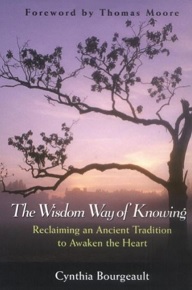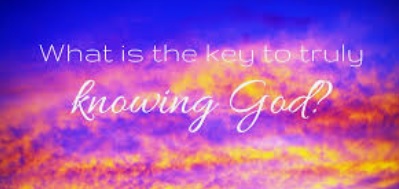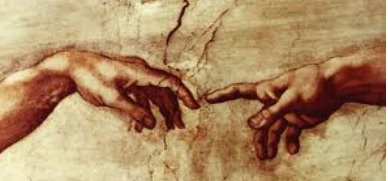Life is a mystery
Everyone must stand alone
I hear you call my name
And it feels like home
When you call my name, it's like a little prayer
I'm down on my knees, I wanna take you there
In the midnight hour, I can feel your power
Just like a prayer, you know I'll take you there
I hear your voice
It's like an angel sighin'
I have no choice
I hear your voice
Feels like flying
I close my eyes
Oh God I think I'm fallin'
Out of the sky
I close my eyes
Heaven help me
When you call my name, it's like a little prayer
I'm down on my knees, I wanna take you there
In the midnight hour, I can feel your power
Just like a prayer, you know I'll take you there
Like a child
You whisper softly to me
You're in control
Just like a child
Now I'm dancing
It's like a dream
No end and no beginning
You're here with me
It's like a dream
Let the choir sing
When you call my name, it's like a little prayer
I'm down on my knees, I wanna take you there
In the midnight hour, I can feel your power
Just like a prayer, you know I'll take you there
When you call my name, it's like a little prayer
I'm down on my knees, I wanna take you there
In the midnight hour, I can feel a power
Just like a prayer, you know I'll take you there
Life is a mystery
Everyone must stand alone
I hear you call my name
And it feels like home
Just like a prayer (oh-oh), your voice can take me there (oh-oh)
Just like a muse to me (oh-oh), you are a mystery (oh-oh)
Just like a dream (oh-oh), you are not what you seem
Just like a prayer, no choice your voice can take me there
God is Mysterious, not Knowable

The "integration of the negative" rather than insisting that God values perfection or an idealized morality, Francis of Assisi intuited, through the example of Jesus’ life and death, that God could be found in all things, even those our religion and culture urge us to reject. Therapists call this pattern of admitting our shortcomings and failures “embracing our shadow.” Such surrendering of superiority, or even a need for superiority, is central to any authentic enlightenment. The Beatitudes are all about incorporating what seems like disorder (a negative), which promotes a much better and different level of consciousness. (Rohr)
God is transcendant and immanent
Trinity where God is Father (divine/spirit) and Son (human/material)
Spirit is the deepest mystery of all, for it shows how that which comes out is still enclosed within, that which is spoken is silent, that which is distinct is still one.11,p61
The glory of the Kingdom is both inner and outer. The two aspects of the Kingdom, the two directions in which we must look in order to see the glory of the face of God, but best to approach the inner one first.11,p103
Eckhart believes that it is through intellect we become united with our goal, whereas 'The Clound of Unknowing' maitains that God can never be attained through knowing, but only through loving.11,p108
The “pure of heart” people (Matthew 5:8) who come to “see God” naturally and easily. If God is always Mystery, then God is always in some way the unfamiliar, beyond what we’re used to, beyond our comfort zone, beyond what we can explain or understand. In the fourth century, St. Augustine said, “If you comprehend it, it is not God.” (Rohr)
The First Commandment (Exodus 20:2–5) says that we’re not supposed to make any graven images of God or worship them. At first glance, we may think this means only handmade likenesses of God, but it mostly refers to rigid images of God that we hold in our heads. God created human beings in God’s own image, and we’ve returned the compliment, so to speak, by creating God in our image! (Rohr)
See Knowing thru Oneness/Paradox
Knowing God via Nature

Once we know that the entire physical world around us, all of creation, is both the hiding place and the revelation place for God, this world becomes home, safe, enchanted, offering grace to any who look deeply. (Rohr)
Ever since the creation of the world, the invisible essence of God and God’s everlasting power have been clearly seen by the mind’s understanding of created things. (Romans 1:20). We know God through the things that God has made. (Rohr)
Daily cosmic events in the sky and on the earth are the Reality above our heads and beneath our feet every minute of our lives: a continuous sacrament. Everything created is a message about the nature of God. Nature is not empty of divinity. (Rohr)
See Spirit revealing itself through matter. We’re always waiting for matter to become a new form in which Spirit is revealed. Whenever that happens, we’re celebrating Christmas. The gifts of incarnation just keep coming! Perhaps this is enlightenment. (Rohr)
The Christ “comes again” whenever we are able to see the spiritual and the material coexisting, in any moment, in any event, and in any person. All matter reveals Spirit, and Spirit needs matter to “show itself”! (Rohr)
Jesus talks about creation for the rest of his life. He talks about flowers and birds and trees and seeds and crops and the earth, and the soil. (Rohr)
Knowing God via Scripture / His Word / Revelation

God, it seems, cannot really be known, but only related to. Or, as the mystics would assert, we know God by loving God, by trusting God, by placing our hope in God. It is a non–possessive, non–objectified way of knowing. It is always I-Thou and never I-It, to use Martin Buber’s wonderfully insightful phrases. God allows us to know God only by loving God. God, in that sense, cannot be “thought” at all.1
Your ways are not my ways ()
The Bible contains “God's thoughts” which are strange and yet marvelous spiritual teachings. Among them are paradoxes. A Paradox is defined as a seemingly self-contradictory declaration but is in fact true, ie. the Holy Trinity
In his goodness, he opens the eyes of our understanding and gives us insight. Sometimes we glimpse more, sometimes we see less, depending on what God gives us the ability to receive. (Rohr,4/7/21)
The Bible / Word of God is living because it is timeless. The living Word is active in the lives of those who hear it, read it, receive it, and obey It.
To say that the Word (the message, meaning, or revelation) of God is in the biblical text, then, does not mean that you can extract verses or statements from the text at will and call them “God’s words.” It means that if we enter the text together and feel the flow of its arguments, get stuck in its points of tension, and struggle with its unfolding plot in all its twists and turns, God’s revelation can happen to us. God's Word reduce us to the posture of wonder, humility, rebuke, and smallness in the face of the unknown? By placing ourselves in the text, I hope this approach can help us enter and abide in the presence, love, and reverence of the living God all the days of our lives and in God’s mission as humble, wholehearted servants. (Rohr)
Any passage of Scripture can be interpreted in both the plain meaning and its ‘spiritual’ (allegorical) sense.
Knowing God thru Wisdom12

Jesus was a Master of Wisdom. 12,p5,p13>
Wisdom is state(of mind)-dependent, not knowledge
As one's level of being increases, receptivity to higher meaning increases.12,p6
State mind requires the whole of our being (body, mind, heart) brought into balance, to awaken.12,p9
"prayer and work" and lectio divina prepares the heart to perceive the signs of Wisdom and to read those sacred road maps of wholeness.12,p19
Love is both the medium and the message.12,p26
Trying to find faith with the intellectual center is simply the wrong tool for the job.12,p31
Finding the way to where our true heart lies is the great journey of spiritual life.12,p34
The emotional center serves as a bridge between the mind and the body; and between our usual physical world and the invisible other realm. The heart has the ability to comprehend the langage of paradox (both-and) without needing to resolve, close down, or protect oneself from the pain that ambiquity always brings.12,p35
When a person is poised in all three centers, balanced and alertly there, a shift happens in consciousness where we present, fully occupying the now resulting in receptivity to higher meaning.12,p36-7
When we stand within the world, God appears transcendent and 'other'. When we stand within God, however, it is the world that appears as 'other' which is an imperfect reflection of the Truth. (p65, The Way of Paradox)
Knowing God via Imagination

Read [John’s] Revelation not to get more information but to revive my imagination. “The imagination is our way into the divine Imagination, permitting us to see wholly - what we perceive as scattered as order, what we perceive as random.” Familiarity dulls my perceptions. Hurry scatters my attention. Ambition fogs my intelligence. Selfishness restricts my range. Anxiety robs me of appetite. Envy distracts me from what is good and blessed right before me. And then . . . St. John’s apocalyptic vision brings me to my senses, body and soul. We can’t get to the unconscious logically, literally, or mechanically. We have to fall into it, I’m sorry to say, and usually by suffering, paradox and the effective use of symbols. Until our certitudes and our own little self-written success stories begin to fall apart, we usually won’t touch upon any form of deeper wisdom. (Rohr,4/28/21)
Imagination is a visionary way.12,p8
Knowing God thru Science

...
Love+Faith Must Precede Knowledge and Knowing thru Love+Faith

On many occasions, Jesus asks his disciples not to tell anyone that he is the Son of God, the Messiah. Why might that be? The only reason I can imagine is that he’s saying every one of us has to come to that knowledge for ourselves. We can’t let someone else do our spiritual homework for us. Jesus says, “Who do you say that I am?” What have you experienced? What have you personally discovered? What knowledge do you have? Until we can live every day of our lives motivated by love, rather than by fear or people in authority, this Gospel will not work. It will not change you or me, and it will not change the people around us. Let’s begin anew. (Rohr)
Love cannot be understood by the mind. And if God is love, God will never be subject to the mind as we know it. God and love can only be experienced. (Rohr)
Buddha said: “What you have become is what you have thought.”
To be united to God we must “break through” the sensible world and pass beyond the human condition to move beyond knowing to unknowing, from knowledge to love.5
Love is the highest form of knowing,” Saint Augustine wrote.Bernard McGinn, who writes, “Love and knowledge are intertwined in Augustine’s mystical consciousness.”6
Gregory the Great said, “Love itself is a form of knowing”, meaning that the love by which we reach God implies a form of knowing above ordinary reason.7
William of St. Thierry put it beautifully in this way: “In the contemplation of God where love is chiefly operative, reason passes into love and is transformed into a certain spiritual and divine understanding which transcends and absorbs all reason.” 8
Dear friends, let us love one another, for love comes from God. Everyone who loves has been born of God and knows God. (1 John 4:7)
Whoever does not love does not know God, because God is love. (1 John 4:8)
Only Love can be entrusted with Wisdom or Big Trust.
Only inside of this mystery of the exchange of love can we know God. If we stay outside of that mystery, we cannot know God. (Rohr,11/8/20)
Knowledge of God means union with God. Jesus said: You must be perfect as your heavenly Father is perfect.11,p21
In Oneness it is no longer merely like God, it has become God.11,p23
Not only God is love, but God is suffering love. (Rohr)
The only way I know how to teach anyone to love God is to love what God loves, which is everything and everyone. Harmonize and balance love our neighbor as our self. (Rohr)
The God our minds cannot grasp can be 'known' by the human heart. (p15, Merton's Paradise Journey)
Contact with God is not a matter of spiritual effort or intellectual learning. It is an identification with God BY LOVE, FOR IT IS LOVE THAT CONSTITUTES IN US THE LIKENESS OF GOD.
If you want to make progress on the path and ascend to the places you have longed for, the important thing is not to think much but to love much, and so to do whatever best awakens you to love. (St Teresa of Avila)
Knowing God Intellectually thru Knowledge

I would not rule out that one could attain enlightenment via intellectual speculation alone, but it would be a long and arduous path. It is unlikely that an individual could ascertain the "proper ingredients" in a single lifetime. (www.religiousforums.com/threads/can-a-mystic-know-god.47435/)
Illusion of Separation -
The Truth Shall Set You Free -
Like knows like (Meister Eckhart)
Meister Eckhart said, “Let us pray to God that we may be free of God.” is a beautifully humble prayer because we know that our present notion of God is never all God is. Augustine said “If we comprehend it, it is not God”. Our present experience is never enough, but it is gratefully where we begin, and these mystics teach us that we grow with each experience of God. (Rohr, 8/7/20)
If not a matter of seeing different things, but of seeing the same things differently.
Intuition becomes a union between man and the divine. It stops being about what you want and more about how you can uniquely serve God. (https://perell.com/note/a-divine-intuition/)
Some may feel that it is right to approach God through faith and love and through knowledge is futile. In the Scriptues the prophets frequently urge us to 'learn to know the Lord' beyond imagination, logical reasoning, revelation, pondering and meditating. It is direct, immediate, and intuitive, unitive/relational thru communion and likeness. (p15-19, The Way of Paradox)
It is not a knowledge which works indirectly (thru reasoning), it is direct, immediate, intuitive. Knower and known are united in an instantaneous flash of illumination when it has been sufficiently prepared and God has given the grace. Divine Knowledge is based upon communion (like when Adam knew Eve) and likeness and intimate/intense relationship. It is grounded upon faith and love, since it involves surrender (a leap into the darkness believing that THERE WE SHALL FIND GOD) casting aside all that might hinder our union with him. This is a kind of union which leads us to actually resemble God in some measure, to become to a certain extend like him. (p19-21, The Way of Paradox)
Knowing God Mystically

Definiton of Mysticism: belief that union with or absorption into the Deity or the absolute, or the spiritual apprehension of knowledge inaccessible to the intellect, may be attained through contemplation and self-surrender.
Mysticism is popularly known as becoming one with God or the Absolute, but may refer to any kind of ecstasy or altered state of consciousness which is given a religious or spiritual meaning. It may also refer to the attainment of insight in ultimate or hidden truths, and to human transformation supported by various practices and experiences. The term 'Mysticism' drived from the Greek word meaning 'to conceal'. Now the term includes a broad range of beliefs and ideologies related to 'extraordinary experiences and states of mind'. (Wikipedia)
Learning to develop your intuition and recognising that you are an intuitive being is the pathway to being a mystic. (https://instituteforintuitiveintelligence.com/intuitive-or-mystic/)
For me they 'Ah ha' moments when reading or thinking or connecting the lyrics of a song to God
It is true to say that "god" can only be experienced. "God" is more of a process, than an external entity. Like in all mundane pursuits, with subsequent experience or by developing a larger data set, one begins to accrue what can be considered "knowledge". In THAT respect, "god" becomes knowable but is a result of digesting that direct experience and assimilating it into "ordinary" consciousness.
mystical experience, and here I am thinking specifically of "the awakening to Oneness" is more of an intuitive leap beyond the confines of ones current thinking. It is because of this "leap" beyond conventional thinking that the individual may or may not be able to describe their experience in meaningful or coherent ways. (www.religiousforums.com/threads/can-a-mystic-know-god.47435/)
Information from outer authority is not necessarily transformation, and we need genuinely transformed people today, not just people with answers. Prayer was meant to be a descriptor and an invitation to inner experience. When spiritual teachers invite us to “pray,” they are in effect saying, “Go inside and know for yourself!” The interior experience of God’s presence activates our capacity to perceive [the divine] in everything else—in people, in events, in nature. A practice of slowing down, of reflection, of asking “big questions” about our desires, our wounds, our values, and our relationships helps us to discover and trust in the truth and authority that lies within us.(Rohr)
A full knowledge of God is both factual and personal. To know facts about a person without knowing the person is limiting; to know a person without knowing facts about that one is shallow. God has revealed many facts about Himself, all of which are important in making our personal relationship close, intelligent, and useful. Had He only revealed facts without making it possible to know Him personally, such factual knowledge would have little, certainly not eternal, usefulness.10 It is possible to know personally the God who has revealed to us the glorious facts about Himself, His universe, His work, and His children.
The divine-human love affair really is a reciprocal dance. Sometimes, in order for us to step forward, the other partner must step away a bit. The withdrawal is only for a moment, and its purpose is to pull us toward him or her—but it doesn’t feel like that in the moment. It feels like our partner is retreating. Or it just feels like suffering.(Rohr-1)
God creates the pullback too, “hiding his face,” as it was called by so many mystics and scriptures. God creates a vacuum that God alone can fill.Then God waits to see if we will trust our God partner to eventually fill the space in us, which now has grown even more spacious and receptive. This is the central theme of darkness, necessary doubt, or what the mystics called “God’s withdrawing of love.” They knew that what feels like suffering, depression, uselessness—moments when God has withdrawn—are often deep acts of trust and invitation to intimacy on God’s part. On the inner journey of the soul we meet a God who interacts with our deepest selves, who grows the person, allowing and forgiving mistakes. It is precisely this give-and-take, and knowing there will be give-and-take, that makes God so real as a Lover.(Rohr-2)
God does not offer Himself to our finite beings as a thing all complete and ready to be embraced. For us God is eternal discovery and eternal growth. The more we think we understand God, the more God reveals Himself as otherwise. The more we think we hold God, the further God withdraws, drawing us into the depths of Himself.(Rohr-3)
But God rewards me from letting God reward me: This is the divine two-step that we call grace: I am doing it, and yet I am not doing it; It is being done unto me, and yet by me too. Yet God always takes the lead in the dance, which we only recognize over time.(Rohr-4)
The mystic is the one who says, “Look what love has done to me.”. Christianity has put major emphasis on us loving God. Yet the mystics consistently describe an overwhelming experience of how God loves us! In their writings, God is the initiator, God is the doer, God is the one who seduces us. It’s all about God’s initiative (GRACE). Then we certainly want to love back the way we have been loved. Mystics invariably find ways to give that love back through forms of service and worship, but it’s never earning the love—it’s always returning the love.(Rohr)
The 3rd eye (6th chakra/pineal gland) provides perception (state of enlightenment/consciousness/intuitive wisdom achieved thru meditation) beyond ordinary sight. (Wikipedia)
Watch a sunset with the 3rd eye has the facility to progress from seeing to explaining to “tasting,” this person also stood in awe before an underlying mystery, coherence, and spaciousness that created a connection with everything else. See 'The Naked Now: Learning to See as the Mystics' (Rohr)
A mystical experience can occur as a simple understanding of unity, the nonduality of an observer and the observed, oneness, feelings of sacredness, peace, bliss, transcendence, a feeling of changing and transforming time and space, or an intuitive conviction that the experience is a source of objective truth and ultimate reality.(Rohr)
The presence of God is 'known' not in clear vision, but as 'unknown'. The contemplative must renounce the mind's activity, put out the light of the intellect and enter into the darkness, wherein there is an 'experience' of the ineffable reality of what is beyond experience. The gift/grace of God involves a 'direct and experimental' contact as God is in the divine self. It means emptying oneself of every created love and going beyond all created images to be filled with the love of God. (p15+29, Paradise Journey by Merton)
Mystics know and enjoy the connected core of reality that is hidden to those who neither desire it nor search for it. Mystics are those who experience the inner grace and connectivity of all things. As Jesus, Paul, and Bonaventure each said in their own way, mysticism is often foolishness to the educated and obvious to the simple. Mystics look out from different eyes that see the grace in all things and the deep connection between all things. (Rohr)
Franciscan Orthodoxy

Franciscan alternative orthodoxy has never bothered fighting popes, bishops, Scriptures, or dogmas. It just quietly but firmly pays attention to different things—like simplicity, humility, non-violence, contemplation, solitude and silence, earth care, nature and other creatures, and the “least of the brothers and sisters.” These are our true teachers.
I believe the Franciscan worldview with its alternative orthodoxy can help us “find new ways forward” and stop being so afraid of change. 2
For Franciscans, the incarnation is not just about Jesus but is manifested everywhere. Once we learn how to see spiritually, “The whole world is our cloister!” in the words of St. Francis himself.
But how did Francis do what he did, from the inside and without oppositional energy? Francis’ starting place was human suffering instead of human sinfulness and God’s identification with that suffering in Jesus. That did not put him in conflict with any Catholic dogmas or structures, merely to the side of them. His Christ was universal while also deeply personal, his cathedral was creation itself, he preferred the bottom of society to the top. Francis showed us that practical truth is more likely found at the bottom and the edges than at the top or the center of most groups, institutions, and cultures.
Since Jesus himself was humble and poor, then the pure and simple imitation of Jesus became Francis’ life agenda. He was a fundamentalist, not about doctrinal Scriptures, but about lifestyle Scriptures: take nothing for your journey; eat what is set before you; work for your wages; wear no shoes. 3
He believed that nature itself was the mirror of God. He called all creatures his "brothers" and "sisters", and even preached to the birds[44][45] and supposedly persuaded a wolf in Gubbio to stop attacking some locals if they agreed to feed the wolf. In his Canticle of the Creatures ("Praises of Creatures" or "Canticle of the Sun"), he mentioned the "Brother Sun" and "Sister Moon", the wind and water. His deep sense of brotherhood under God embraced others, and he declared that "he considered himself no friend of Christ if he did not cherish those for whom Christ died".4
Knowing God thru Symbols and Numbers

Circle: The Trinity (God) is more a circle than a pyramid.
6: incompleteness
7: completeness